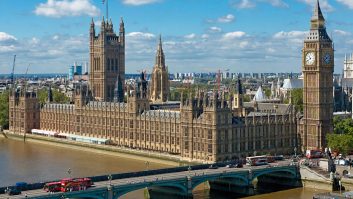
Maintaining access to talent, UK production tax credits, and getting clarity around regulatory equivalence with the EU are vital to resolving concerns regarding Brexit, according to the Digital, Culture, Media and Sport Committee in a report released today.
The potential impact of Brexit on the creative industries, tourism and the digital single market examined the potential impact of changes to three key areas: funding, the regulatory environment and the workforce.
In delivering this report, the Committee said it sought to identify areas of concern that need to be addressed as part of the Brexit process. The report assumes the UK will leave the EU at the end of March 2019 and will not look to maintain membership of the European Single Market beyond any agreed transitional period.
“While this is still the subject of debate, it is a scenario we have to plan for,” the report stated.
DCMS Committee chair Damian Collins MP said: “The UK is a global leader in the creative and digital technology sectors, including telecommunications. Our creativity, favourable production tax credits, and the access to talent, all underpin our success in these areas.
“The challenge of Brexit is to maintain these advantages in a new regulatory environment, and to remove uncertainty for businesses and organisations, in particular those that work from the UK, with employees, suppliers and customers across Europe.
“An honest assessment of likely outcomes of the Brexit negotiations—whether regarding regulatory equivalence or divergence, the workforce or the effects of losing direct EU funding—is needed from the Government.”
DCMSC reported that creative industries across the UK employed 1.9 million people in 2015, while the technology and digital sector grew 32 per cent faster last year than the rest of the economy – boosting GDP by approximately £145 billion per year.
However, the report listed various areas where Brexit could have a serious impact:
Workforce
· The overwhelming message from businesses and organisations across the creative industries and tourism sectors was to retain the access to the talent they need from outside the UK, particularly as a large percentage of the international workforce supporting them is made up of EU nationals
· There is a need for reliable data now about the workforce and possible skills gaps, should this access to talent not be maintained
· Clarity of proposed revised immigration rules and processes is essential to businesses in the creative industries to allow them time to prepare for any new Brexit environment
Funding
· A Government mapping exercise setting out precise streams of existing, direct European funding for creative and cultural organisations, and an overview of future funding, should be published in order to assuage current uncertainty over the nature of long-term funding.
Regulatory environment
· In the telecommunications sector particular uncertainty exists around possible price hikes for UK mobile phone customers using mobile data in the EU post-Brexit. The Government must be open and honest about the latest predictions regarding data roaming charges
· A Government action plan describing how UK policy development on data protection will take place after Brexit is now a priority
· The Government must set out its intentions for co-operation with our European neighbours in respect to copyright protection, including enforcement actions
· To address profound industry uncertainty the Government must as an urgent priority state its negotiating intentions with respect to the Country of Origin rules framework and set out its contingency plan, should the rules cease to apply after Brexit. In addition, the Government should make clear whether the audio-visual sector will form part of the formal trading negotiations with the EU
· It is important that the Government sets out progress on negotiations regarding the single aviation market, and reassures the tourist industry that contingency plans are being made in the event of no deal
Collins added: “London – Europe’s most visited city – is likely to be sufficiently well-established to withstand challenges from other potential European creative hubs, although other major European cities – including Berlin, Paris, Amsterdam, Barcelona and Dublin – do have ambitions of their own, which should not be underestimated.
“It is essential that we get clarity of proposed revised immigration rules and reliable data about possible skills gaps.
“British institutions are already missing out on funding. The Government should publish a map of all EU funding streams that support tourism and creative projects.
“Brexit presents challenges for all these industries because of the uncertain nature of the future regulatory environment. The Government should set out as a matter of urgency those areas where it believes that Brexit offers an opportunity for beneficial regulatory reforms, and how it intends to capitalise on any such opportunities.
“It should also set out where it believes that maintaining equivalence would be the most favourable outcome, for the industries and consumers alike.”





